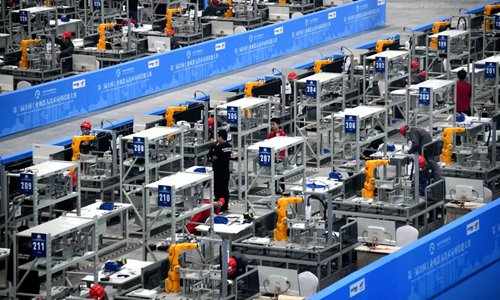HOME >> SOURCE
Coronavirus sends orders for industrial robots soaring amid labor shortages
By Ma Jingjing Source:Global Times Published: 2020/3/2 21:28:40

Contestants compete in the 3rd National Industrial Robot Technology Application Skills Competition in Jinan, capital of east China's Shandong Province, on October. 18, 2019. (Xinhua/Zhu Zheng)
As Chinese companies struggle to reopen amid labor shortages caused by strict coronavirus control measures across the country, demand for industrial robots and highly automated production lines has been catalyzed recently.China's light-weight robot manufacturer Rokae Robot told the Global Times on Sunday that its shipments are forecast to surge about 50 percent in 2020, as labor-intensive manufacturing firms expressed eagerness for automation due to labor shortages amid the coronavirus outbreak.
On February 8, when most companies were waiting to resume operations due to the outbreak, Rokae Robot's plant in Zoucheng, East China's Shandong Province, began its delivery of a flat pipe stacker to Skawina, Poland. It was the company's first delivery after the Spring Festival.
"After we officially resumed production on February 12, we received many inquiries from potential clients, while many old clients said they'll make more orders," said CEO Tuo Hua, noting that the management figuring out how to meet the requirements of new orders by several labor-intensive factories.
SIASUN, a high-tech robotics company belonging to the Chinese Academy of Sciences, told the Global Times on Monday that the company has received orders for nearly 100 sets of smart production lines for face masks, with the first few dozen pieces of equipment expected to roll off the production line soon.
Amid a nationwide clampdown on traffic to contain the spread of the virus, hundreds of millions of workers can't return to their posts, forcing companies to send buses to villages to pick up their employees or give financial incentives.
"It's extremely hard for labor-intensive industries to find workers, but those adopting automated production lines are barely affected by the outbreak, sparking demand for robots replacing labor or automation solutions," Tuo told the Global Times on Sunday.
He considered the trend a positive stimulus to the industrial robot industry in the long run, although there may be delivery challenges in the short term, and some clients may cut their fixed-asset investment budgets because of macroeconomic downward pressure.
China is the world's largest industrial robot market. The country's installations stood at 154,000 units in 2018, accounting for 36 percent of the global total. The robots are mainly used in industries such as automobiles, electronics, metals and machinery.
"A substantial growth in applying industrial robots in a range of segments of the manufacturing sector will give rise to the development of special robots, setting off a new boom for industrial robots' applications," Wang Guoyao, deputy secretary of the Zhejiang Robot Industry Association, told the Global Times on Sunday.
Since the outbreak, robots have been applied in many scenarios like package delivery, disinfection and body temperature tests to reduce human contact. Chinese e-commerce platform JD.com launched robot and drone deliveries in the epicenter Wuhan, Central China's Hubei Province in early February, while it also arranged two drones to spray disinfectant in an industrial city of North China's Inner Mongolia Autonomous Region.
"If the disease can be controlled by April as some experts predict, domestic companies' demand for industrial robots will be on the rise in 2020," Wang said, adding that obvious growth won't be noticed for months as manufacturing companies' production lines need remodeling to introduce automation.
Cong Yi, a professor at Tianjin University of Finance and Economics, told the Global Times on Sunday that domestic manufacturers should seize the opportunity to seek upgrading.
"Automation and intelligence will not only improve manufacturing safety and efficiency. Those factors will also help companies resist risks and maintain long-term competitiveness," he said.
RELATED ARTICLES:
Posted in: INDUSTRIES,BIZ FOCUS